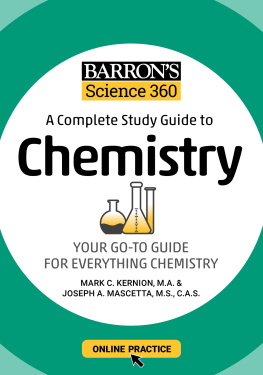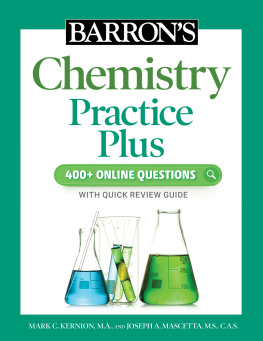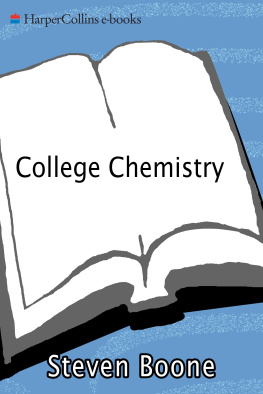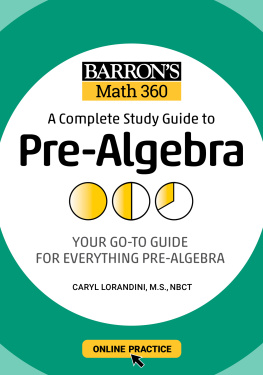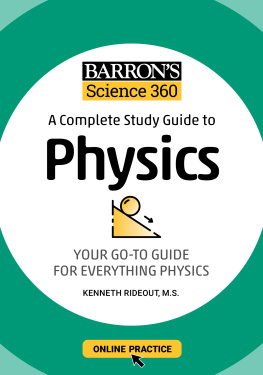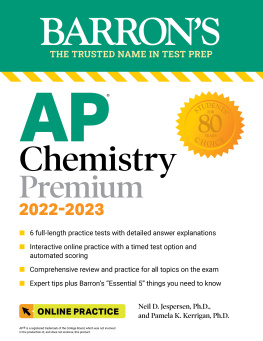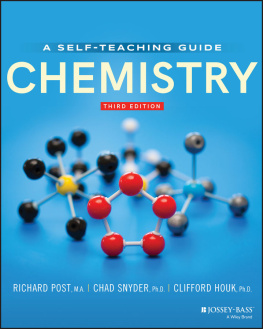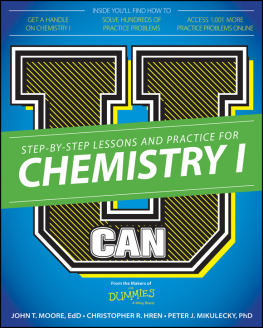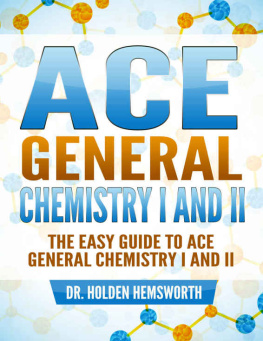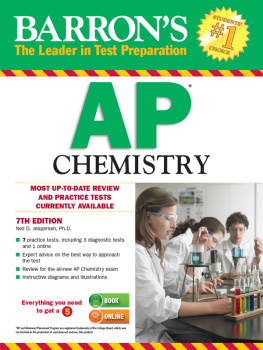Table of Contents
Guide
Page List


About the Authors:
Mark Kernion has been teaching AP and honors chemistry for the past twenty-five years at Mt. Lebanon High School in Pittsburgh, Pennsylvania. In 2006, he was inducted into the Cum Laude Society, which is dedicated to honoring scholastic achievement in secondary schools. He was the recipient of the 2007 Yale Teaching Award. An inventor, he holds a number of patents.
Joe Mascetta has taught high school chemistry for twenty years. He was the science department coordinator and principal of Mt. Lebanon High School in Pittsburgh, Pennsylvania. He also served as a science consultant to the area schools and is a past president of the Western Pennsylvania Association of Supervision and Curriculum Development (ASCD) and the State Advisory Committee of ASCD. He holds degrees from the University of Pittsburgh, the University of Pennsylvania, and Harvard University. He was a participant in Harvard Project Physics, a General Electric Science Fellowship to Union College in Schenectady, New York; the Chemical Bond Approach Curriculum Study at Kenyon College, Ohio; and the Engineering Concepts Curriculum Project and Science Curriculum Supervision at the University of Colorado.
Copyright 2021 by Kaplan, Inc., d/b/a Barrons Educational Series
Copyright 2019 by Kaplan, Inc., d/b/a Barrons Educational Series under the title Chemistry: The Easy Way
Copyright 2019, 2009 by Kaplan, Inc., d/b/a Barrons Educational Series under the title E-Z Chemistry.
Copyright 2003, 1996, 1989, 1983 by Kaplan, Inc., d/b/a Barrons Educational Series under the title Chemistry the Easy Way.
Copyright 1981, 1969 by Kaplan, Inc., d/b/a Barrons Educational Series under the title How to Prepare for College Board Achievement Tests: Chemistry.
All rights reserved under International and Pan-American Copyright Conventions. By payment of the required fees, you have been granted the non-exclusive, non-transferable right to access and read the text of this eBook on screen. No part of this text may be reproduced, transmitted, downloaded, decompiled, reverse engineered, or stored in or introduced into any information storage and retrieval system, in any form or by any means, whether electronic or mechanical, now known or hereinafter invented, without the express written permission of the publisher.
Published by Kaplan, Inc., d/b/a Barrons Educational Series
750 Third Avenue
New York, NY 10017
www.barronseduc.com
ISBN: 978-1-5062-8143-8
10 9 8 7 6 5 4 3 2 1
CONTENTS
Barrons Science 360: Chemistry is designed for self-learners and for those looking for a comprehensive guide to everything chemistry.
This book includes a number of helpful tools that will reinforce your knowledge of the topics as you learn. Youll find:
What You Will Learn Each chapter begins with a list of the topics covered. This is a useful tool for categorizing the learning process and for devising a study plan.
Terms and Definitions Important terms are defined where necessary to help guide you through topics successfully.
Examples with Solutions Numerous examples for each topic are included throughout, along with answers to check your progress.
Review Exercises Each chapter closes with review questions that will help determine which topics you have a solid understanding of and which topics you need to revisit.
Online Practice Questions Access to 50 online multiple-choice questions designed to enhance your understanding and to test your knowledge. To access, see the card at the front of the book.
BARRONS 360 STUDY TIPS
SET GOALS AND OBJECTIVES
As you use Barrons Science 360: Chemistry, it is a good idea to set personal goals to chart and direct your learning objectives. A goal is something that you wish to achieve over a period of time. Objectives are short-term targets that help you reach a particular goal. For example, suppose that your goal is to learn all of the elements in the periodic table. You can reach this goal by establishing short-term objectives--such as studying five elements a day--that will enable you to successfully reach your long-term goal of learning all the elements in the periodic table.
CUSTOMIZE YOUR STUDY
Barrons Science 360: Chemistry does not need to be studied in a linear fashion. If there is a particular topic that you want to study or reinforce, just turn to that page or chapter, and all the information along with the features mentioned above will be available to you. There are also some things you can do to optimize your study time and ensure you are retaining the important information you want to learn.
Before You Read
Review: Review all chapter headings and subheadings and the information in the What You Will Learn section.
Scan: Glance over any illustrations, tables, or graphs in the chapter youll be reading.
Locate Terms and Definitions: Read any bold or italicized words and study their definitions.
Get Ahead of Yourself: Review the Practice Exercises at the end of the chapter and keep them in mind as you study the chapter.
While You Read
Predict: Try to predict the answers to the questions in the Practice Exercises. This will help flag important information to keep an eye out for as you read.
Read Aloud: Hearing what is written on the page leads to better comprehension and retention of information.
Visualize: Developing a picture in your mind of the information, concepts, or material presented makes it much easier to remember.
Highlighting and Note-taking
Identify Important facts: Dont over highlight. This will have the opposite effect and actually negatively impact your ability to retain the information you need to remember.
Take Notes: Jot down key ideas and concepts you are having a hard time understanding.
Draw It Out: Sketch out pictures, graphs, diagrams, or tables, to help visualize what youre reading. This is particularly helpful with complex topics.
After You Read the Chapter
Talk It Out: Summarize what you have learned from the chapter aloud to a friend or a family member. Explain it as if they are learning it for the first time.
Answer the Questions in the Practice Exercises: Did you need to look them up, or were you able to answer them from memory?
Reinforce: If you found yourself having to look up the answers to the questions, go back and read those portions of the chapter again until you feel confident moving on to the next chapter.
Good luck!
WHAT YOU WILL LEARN
Upon completing this chapter, you will be able to:
Identify types of matter as elements, compounds, or mixtures
Identify chemical and physical properties and changes
Explain how energy is involved in chemical and physical changes
Identify and use the SI system of measurement

